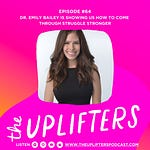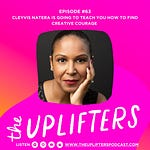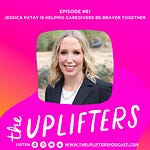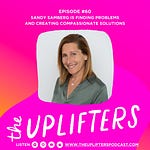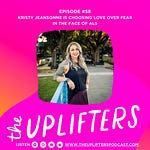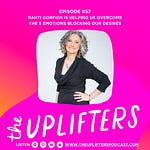Listen to our latest episode in Substack, Apple Podcasts, Spotify, YouTube, or wherever you get your podcasts.
This Week on The Uplifters Podcast
Sam France’s childhood was chaotic. But her parents didn’t get a guidebook for raising little Sam, so they were left to learn on the job, basing their decisions on their childhoods.
Sam’s daughter was also born without a guidebook. Go figure.
Sam realized there had been a generational curse handed down through her family and felt determined to create a new guidebook.
In this episode, we walk through each chapter of her daughter’s life from birth to college to understand how Sam broke this generational curse and the influences that shaped the parent she’s become – one who enjoys the journey.
On the surface, this episode is about parenting, but really it’s about how to be our best in the relationships that matter most.
You’ll learn:
[00:15:00] How to find peace during transitional stages.
[00:17:15] How to be responsive instead of reactive when we are triggered. **Spoiler alert: Other people’s responses are not about you.**
[00:20:00] How to create open pathways for growth conversations when emotions run high.
[00:28:00] Bonus! This episode also includes a meditation at the end, so carve out 3 minutes to breathe, reflect, and honor your vital feelings and needs.
Want more?
Follow Sam on Instagram and check out our favorite books on parenting:
The Teenage Brain: A Neuroscientist's Survival Guide to Raising Adolescents and Young Adults
The Emotional Lives of Teenagers: Raising Connected, Capable, and Compassionate Adolescents
Untangled: Guiding Teenage Girls Through the Seven Transitions into Adulthood
If you haven’t done so already, click below to upgrade your subscription, and unlock monthly Uplifter Workshops with our guests, weekly Uplifters Unfiltered videos, and more! And because we all rise higher together, consider gifting a subscription to someone in your life who could use a boost.
Let’s keep rising higher, together!
Aransas 💓
MESSY TRANSCRIPT
Aransas: Welcome to the Uplifters Podcast. I'm your host, Aransas Savas, and today I'm joined by my friend, coach Sam France. In this episode, [00:01:00] you'll hear how her own childhood, her mommy mentors, and others shaped her own mothering.
But really this episode isn't just for moms. It's for anyone who wants to be their best selves and their most important relationships. Sam, welcome. Thank you for being
Sam: here. Hey there. Thanks for
Aransas: having me. We gotta talk about childhood. Let's just start there. Tell me about what it was like to be Little Sam in
Sam: the world.
Well, little Sam comes from divorced parents and remarried by the time I was five. So there was, you know, togetherness and separated and was five my stepfather and moved. So I started flying to Florida where my dad was by myself, who was remarried to my stepmom from the age of five or six, maybe on every school holiday until I was an adult [00:02:00] and beyond.
So I lived with my, like I said, my mom, my stepdad, and a family of five children. And I would go to Florida to my dad's house, and I would be an only child with my stepmom. So childhood was chaotic.
Aransas: What was it like for you to have that vastly different experience in two different places?
Sam: I used to say I had the best of both worlds and I did.
I love that idea of being able to be an only child and have the attention and be cared for. And yet coming out of though the family in Connecticut where I lived with the, with the Chaos family, it was a challenge going from sort chaoticness to, to be feeling taken care of. It was, um, was disconnect. I'm an emotion.
We're all emotional beings cause we're, we're, we're humans. My emotions were definitely not necessarily being worked with on how to regulate them. They would just be explosive. And so that would be [00:03:00] kinda like tumultuous to go from one space to the other. Cause my emotions would sort of, I wasn't, I couldn't leave the chaos and go into the quiet and know, get into quiet, chaotic, and then return miss.
Aransas: Yeah, it's sort of like those old science experiments, right? Where they put some liquid and baking soda into a bottle and then shake it up, right? There was all of this energy contained in that space, and then I imagine like trying to trap that chaos and feeling like there is the result, as you said, this explosiveness, this emotional human being who.
Just wants to express, but having it to sort of contain it in that chaos had
Sam: to have been hard. Yeah. And especially without listen, not that no one, none of us come with books. It's not like we birth out a book to go with us. So it's not like, oh, here on page 42 you do
Aransas: this. Here's the [00:04:00] manual for raising Sam.
Sam: Yeah. So it's not like there's any blame. But looking back, there was not the container of, I mean, my poor dad and stepmom were like, whoa. And then I, I'd quiet.
Whatever, we're not even paying attention to you because it's fine or whatever, you know? So it's sort of just unparented in that way. It's funny, I always wanted to know what the right thing to do was. If someone could just tell me what the right thing to do is or just show me, right. I would that, I always craved that.
Mm-hmm. And
Aransas: then you became a mother and then I became a mommy. And how well prepared did you feel to do that? Your daughter didn't come with E Emmanuel either?
Sam: Nope, she did it. My sister-in-law was the one who joked with me. That's where I got it from. She's like, when she, shes like, how you doing? She's like, you know, they don't come with any manuals, you know, like, you know, it's interesting I that I was prepared, but I [00:05:00] wanted to have child.
I had wanted to married, I wanted to family, or at least parent.
Aransas: What did you do to start to become the mother you wanted to be for your daughter?
Sam: Well, way back when, when I was in therapy and I've been in therapy on and off since I was 16, so, and I love therapy. I was given a piece of information around family curses that get carried down and how I might be at a place where I could stop my particular line of women family cursing.
And so when I became a mom that came right back up into my life. I'm not my mom and I'm not my dad, but I'm in the middle. So I kind of like went with that. Okay. Like, I'm gonna parent sort of from here and do the best I can, which is, you know, challenging of course at times. Parenting is really freaking hard and it's millions of tiny decisions. Often in an instant. Yeah. We don't get a chance to think through them and to strategize and to plan. We're just living and trying our best to love and support these little people. What was your guiding light?
Sam: I don't have to take down this generational.
That's been going on. I can be different. And that was force.
Aransas: Mm-hmm. And how did that in the parent
Sam: Every stage you get to, like there's the beginning of the stage, you're like, I dunno, do this.
And then you get into the stage,[00:07:00]
you know, and by the end you're like, I got that stage. It's, and then start all over again. Right. So it was almost that patterning kind started to take structure and be like, alright. Every stage is a new stage. Every stage is awesome. Mm-hmm.
Aransas: And what did you find to be the most difficult about being present and being true to yourself as a parent?
Sam: The most difficult part was feeling lonely. Right. Feeling like I can't take a day off, you know, I dunno if I'm proud of this, but I, it is true. I was voted class laziest in. And I can't be lazy anymore. Like I can't, oh, I don't. Well, and wanna watch tv. Little nothing do sweetheart
was really challenging. Lonely.
Aransas: What were those early [00:08:00] teen years like for you?
Sam: The teen time. The tween time. I mean, I read about it. There's this one book called, That was just wonderfully helpful in terms of like physiologically what's going on and it as to why they tell you they hate you or why they tell you that, you know, they wanna do whatever or they tell you these things.
So I had at least knowledge as to why that was happening in those early years. But it was a real challenge cause it literally one day went from Mommy can and mommy, is this okay? I'm doing this anyways. I don't care what you say. I hate you. And screaming like just, uh, volumous screaming would go on, and that sets me off and that makes me scream.
And then we're all in it together. So that was a challenge. I was like, ready to call the cops on her. Like, what's, what would be said to me? Husband [00:09:00] was like talking about like, that's scaring her. That's making worse. Like, what do you mean? I don't know what? I don't know what else to do. I'm lost. So it was like learning all of that in that time.
Aransas: It is so true. I think that in the times of transition, especially with our kids, that is where we are most likely to fault. Back to how we were parented, because we don't have a yet,
Sam: it was an eyeopening moment. Oh.
I know exactly who I wanna be. I wanna be the mom who understands that you're the kid and I'm the adult and I give you space to pop off. Cause where else do you have safe space but in your home to like grow and stretch and be uncomfortable and do that stuff and I can contain it for you without taking it personal and I can contain it for you with creating some healthy boundaries.
And I can, you know, I can do that. I could. It was that moment of like seeing [00:10:00] who I knew I could be. That helped. Yeah, move that sort of forward into those directions and then that became my guiding light of like the mom. I, I know I, I know the mom. I can be, I know other mom. I'm a big fan of other people do it.
If other people do it, I can do it. So I could see other moms that would do it and be do it. So it was definitely that shift. It was a choice. It was really a choice.
Aransas: What were the moms you admired
Sam: doing? No, not yelling back at their kid. Not the moms I admire would just like let it all roll off their back and know that no matter what, it's gonna be fine.
And yet at the same time, not dropping the ball. Right. So like your kid could yell at you and you could, you know, be like, all right, we'll talk about it later, but then you don't. That's dropping the ball in my opinions
Lesson. 12 year old, of course you're upset. It makes sense. You're [00:11:00] 12, your hormones are raging and God bless your soul for everything going on. That said, when you do scream and yell, it's not fun to hear. Right. You know, you're not doing it on purpose. I get that. Just something to keep in your mind as you work on it, as you go forward.
Right. So like that's what I, that would be the kind of mom that like, It's like you are allowed, you get space to be a mess and I wanna make sure we're contained in this space where there's boundaries I don't want you to learn that yelling and screaming is okay, period, to get what you are.
And so it was just like giving that space to be that. But then making sure I came back around and said, Hey, I just wanna make sure we're clear. That's all. we all do that. And we just say, we're sorry. Hey, I'm sorry for being that way right now.
I'm feeling this way. I did not mean to dump on you. I apologize. Let's move on. Mm-hmm. So was that repeat right? Constantly. So those were the moms, like the moms that would just like, you [00:12:00] know, carefree, easy flow, let it all go and have the best time.
Aransas: And so how did that affect your relationship with your
Sam: daughter?
It really gave me an opportunity to enjoy her and to play with the teen tween time rather than taking it so personal and gave me the start of practicing not taking anything personal at that matter, and it really became a lot more fun. Cause I could easily just be like, stop talking to me like that. That's not fair. But in that moment, that's not gonna get what, it's not gonna get what we want. So it was, you know, it really allowed for me to participate and that gave way for us. A much closer relationship probably [00:13:00] than we would've had if I just kinda made sure.
Like to crack the whip every
Aransas: time. I think a lot about, for teachers, I suspect it's especially hard as a teacher to work in any classroom environment that is intentionally wired for the kids. So the PE teacher, the theater teacher, the band teacher, They're like getting these kids all amped up and then trying to somehow keep them contained at the same time.
Whereas I think, you know, other classes are just quieter and they're more intentionally contained, and so you don't have to. Try to contain a massive amount of juvenile energy while also creating it, which is just a bizarre attention to hold. But I think as parents, we're doing that a lot. We're like, be your full self and let's communicate about the effects of what that [00:14:00] is and how that feels to me as a human being.
And it's a lot to hold.
Sam: It's a lot paying attention. Yeah.
Aransas: So your daughter now has started college and how has that been for the two of you?
Sam: It's been good. I mean, the connection during Covid was so intense cause we're just home together. So I would say the slow roll into college was sort of kinda coming from that, like slowly separating and giving her the information.
It's a, it was a harsh one too. Oh, you're 18, you're on your own. Congratulations. You your own choices. Bye. It's a very, it's like, wait. She's like, it, it reminds me of the opposite when she was like, mommy, can I have to hate you now? It's like you helped shape me, mom, and it's, and can my own opinions and.
What I don't know what to do when I get sick. It's been a slow transition, but I will say that after the first semester kind of [00:15:00] came and got, you know, settled, the second semester was definitely more of a landing. Mm-hmm. And I'd say she definitely started thriving and figuring more out on her own. And the language went from, instead of me giving you everything, it's now for you to make your own decisions.
But I'm here to support you, honey. I am just here to be your biggest cheerleader, your support system, your sounding board. You know, I think we've achieved that pretty much for the most part. What? I think
Aransas: this is a reminder of something that we see in life in general, that it's really easy to see the transition as the thing.
And so we can get caught up during that transitional period and feel like, ah, this is unsettling. This is confusing. It's uncertain. I don't know how to behave or what to do. It feels really hard, and of course it does because it's [00:16:00] a transition. And it is the way it is going through that, that gets us to what's next, and we use that transition to be uncomfortable and to find out what's hard and uncertain and confusing so that we can make things easier and more comfortable and aligned and confident.
In whatever follows the big transition. And I hear that kind of over and over as we journey through this story of your mothering, that the transitions were hard and messy and you used them to formulate who you wanted to be in that stage of the journey. Then you got to the next big transition. It was like, oh, this is chaos.
Going back to your original idea, No. Let's see what we build out of this chaos. Yeah. What do you believe the best wisdom is that you could [00:17:00] impart on a
Sam: parent? Oh, God. Don't take it personal. It's so not about you. That for me, has been the biggest lesson I take away as a parent all the time. Like just I can hear myself taking she'll, she'll do something, it'll irritate me, and I can hear myself being like, don't do that.
And I try to, okay, let's pause sweetheart, on the inside. Let's not take that personally. She's not yelling at me. Let's not take it personal. Let's take a moment just to pause and just instead of be reactive, be responsive. That is the biggest practice I do as a parent and the biggest wisdom I've gained is like just being able to take that pause before reacting and that gives you more space to play a little
Aransas: bit.
How do you do that, Sam?
Sam: I catch myself. I can. So she'll say something and I can feel it right there. And that's my sign. Oh look, I'm annoyed. Don't say anything like, don't say anything in this moment. I can still be annoyed, but I don't need to [00:18:00] yell at her. I don't need to say anything in this one moment.
Cause she's annoyed. So let's, ok. Great. Talk about it later is a good one for me. We'll talk about it later. That's a great way that I don't react and I'll just respond. No problem. And then circling back later. That's the key I find more than anything, but I just really try to catch myself and then I honestly just be like, let's not take this moment personally, Sam.
It's not about you. It's not about you, and she's a great kid, and so leave her, be in your safety of your home that she's having a moment. Give her a break. Give yourself a break and see what happens
Aransas: and how well that would serve us in every relationship. I almost almost said, oh yeah, this is really true for everyone who works in any sort of caretaker or caregiver capacity.
And I was like, it's also good for marriage and friendship and being parented. [00:19:00] I guess it's just pretty good in general.
Sam: Yeah, that pause, that pause. When I can feel that react when I feel myself being frustrated, that is a sign to not react in that moment. Whatever it is, it's gonna be okay in that moment.
And if it's really bothering me, I can wait till it's so, and then figure out how to, it's what I've been trying to do now is be like, so how can I say what I wanna say? Lovingkindness, thoughtfulness, empathy, compassion for them. For me,
Aransas: when it's authentic though, because I think what you're saying is I don't have to be compassionate and.
Kind and sweet all the time. Sometimes things are gonna get on my nerves and I'm gonna need a moment to go and take care of me before I can parent this other person in the way that I want to, or be present for this other person and the way that I want to.
Sam: Yes, a hundred [00:20:00] percent. And then with whatever I did wanna say, figure out how to say it through a of lovingkindness spoken.
If someone's gonna yell at me, am I gonna take that and be like, oh, okay, I heard you. No, but if someone says, Hey, by the way, I noticed, or this, or whatever, we kind of have a nice conversation about it that might seem, that probably will sink in a little bit better for me. So I'm trying to do that outwardly as well.
So like, yes, I'm, of course I'm annoyed. You're allowed to be annoyed. We're human beings. Duh. But reactive in the moment with the annoyance, is that gonna get me what I want? Which is for you to stop yelling at me. No, but I can easily say, Hey, Let's just talk about this later. Fine, no problem. I hear you loud and clear.
I understand you're upset. I make sense. Let's just talk about it later. And then that is a way to diffuse it. Cause I can feel myself being so excited. So diffuse, diffuse, diffuse. And then when it's calm, circle back around and figure out how I wanna communicate it. The other
Aransas: thing you did there,That was [00:21:00] super smart, is you said, I
Sam: hear you.
I hear you.
Aransas: So you acknowledged and validated your child in that moment of her intensity before creating that distance?
Sam: Yes. Cause it's normal. You're a human being of course. Bless you. You, you should, you, of course you feel that way, who wouldn't? And yet, let's just talk about it later. Mm-hmm. Right. I'm not trying to dismiss you or your feelings or your experience.
I definitely, we're all humans get it. But if I'm, if I feel reactive in that moment that I don't, I wanna disengage. I give you your face of whatever you're doing. We'll just talk about it later. Mm-hmm. Talk about it later. Talk about it later.
Aransas: It's also though, I think just to reinforce something you said that was super important, you said, but you have to come back to it just saying.
I'm gonna come back to it [00:22:00] and not doing that. That only makes it worse, that that takes away from any trust that might be built from there. So the key here is to acknowledge and validate, to create the space and then. To actually come back to demonstrate that you genuinely care. Yep.
Sam: That's the key, I think, to parenting that is hard or is like, don't forget to circle back.
It's like, remember you got, you remember, you wanna circle back so that the next time that experience happens, there can be a different way of playing with it because you circled back and you laid a different foundation and you shared or whatnot, right? Mm-hmm. It's that habit, that learning lesson, right.
How you build a habit kind of concept, so Yeah, yeah, yeah, yeah. It's really important. I think one of the things is circle upbringing, terms, giving
boundaries. [00:23:00] You are gonna wanna hang out with you if yell them, but it makes that you're yelling and screaming cause your hormones are ing. Mm-hmm.
Aransas: Your hormones are raging and you're having a true emotional reaction. I like have a little bit of a resistance to just blaming things on hormones. Fine.
Sam: It's true.
No. And you're having a human experience, but yes, you're having a human experience. Yeah. But it's just what do you wanna get outta it in that moment? Right, right. And when you circle back around, when it's quiet, it's funny, I do the same thing sometimes. I wanna ask my daughter to do something for me, or I have a thing and I'll say, Hey, do you have a minute?
And in that answer, I could hear if I should keep asking or we'll, Cause that might not be the time that she's gonna be receptive, or I could try and she's like, no, I don't wanna, ok, great. And then, you know what, A week later, I'll try it again. She'd like, oh, I'm in a good mood. Sure I can do that. Yeah. You know?
Yeah. Not because I wanna get it done. It's like, where are you on it? And how can I give, you know, I'm the parent. I am the parent. I'm a big fan about being the mom and not the best. Mm-hmm. In that way. [00:24:00]
Aransas: And you're a human being who wants to be liked,
Sam: connection matters. Right? Right.
Aransas: And so, I mean, I think the urge to be the best friend comes from a good place, right?
It comes from a love, it comes from a very human need. Yes. And what is the risk?
Sam: Right? I, I mean, my risk is like you have, you can have a bazillion best friends. I help support you the best version of yourself. Healthy boundaries, active participation from my, like where I can come back. But I would expect, it's almost like I don't, I don't even care if you like me or not.
I just want us to have mutual love for each other. Cause we're, cause we're connected. So you might not like me. I might not like you at times. I don't really care. I care though, at the end of the day, the foundation is like, I'm your mom. And I am always gonna be the mom and not your best friend who's gonna tell you whatever you wanna hear.
Go talk to your friend. If you wanna hear what you wanna hear, [00:25:00] she'll tell you everything, but I'll give it to you straight. Mm. I don't wanna sugarcoat it a little bit, but that's what I mean about loving kindness. Like SP speaking in a language that we can have a connected conversation as opposed to me like telling you what to do.
No one wants to be told what to do. No,
Aransas: no, no. It just creates resistance even if it's in our best interest to listen.
Sam: Yeah, and I just mean for like almost the between teen time, like the younger ones is different cause obviously there's a different parameter or value parent than, but yeah, just sort of keep trying to, yeah, keep trying to shape and not take it personal and.
And almost, it's almost like after I read the book, the Teenage Brain, I, I started to brainwash myself being like, every time she yells at me, remember that's her being normal. And if she didn't yell at me, I should be worried. Mm-hmm. Like tell being authentic, telling the truth, not trying to sugarcoat it or change it, but working with it.
And when you talk
Aransas: about getting support for parenting, part of it is [00:26:00] reading trusted resources, listening to podcasts, collecting information about what is normal and what isn't. And. Allowing ourselves to, to see beyond our own individual experience, while also being present and aware to what our child individually, genuinely needs.
I also find that in my experience, my kids are best when I create space for them to tell me what kind of parenting they need. And so in those retroactive conversations after a challenging or intense moment to say, So what do you need in those moments? How can I support you best? I get the best freaking insights about how to meet their needs to parent the kid I have when we come back with that question.
Other than [00:27:00] versus assuming I know how to parent
Sam: them. No, and it's even different in different ages and stages, right? So whatever the answer is today might be a different answer next week or two months from now or a year, but to check in. Aransas: So as we start to wrap up here, what do you believe is most important to remember from this
Sam: conversation? Parenting is hard just to like play with it and almost enjoy the challenge, I'd say would be the hardest and most exciting thing to do at the same time.
Mm-hmm.
Aransas: Yeah.
Sam: Well said. That makes sense.
Aransas: Yeah. When we're talking about something that often feels like it makes no sense, I think that's an accomplishment. So my friend [00:28:00] Sam, let's just, uh, close out here as we often do with a couple of quiet moments of reflection with ourselves. I will invite you all out there listening to just take one hand and place it on your heart, one hand on your gut, and to really tune in to your experience of parenting or relationships
and. Ask yourself,
how am I now in my most important relationships?
And as you hear a little whisper from yourself of what that answer might be, maybe ask [00:29:00] yourself.
Sam: What
Aransas: needs are being met right now
and maybe what needs are not met?
We always have met and unmet needs, and they're direct. Related to our emotions by getting curious about our emotions and our needs, we open ourselves up to greater understanding of ourselves, more grace, and we empower ourselves to ask for what we need. To set ourselves up to be who [00:30:00] we wanna be, even in the most challenging situations.
Wherever you are, I hope you'll just take a nice, deep cleansing breath. Thank yourself for, get curious for a moment. About how you are and what you need, and letting those quiet little voices that come to you be your guide and want to be or do next. Sam, thank you for sharing your story, your experience.
Thank you for being my friend and for teaching me so much through your life and your parenting. For those of you listening will share lots of links on the uplifters podcast.com so that you can find out more about Sam and her work. And we will be sending out, as we do every week, [00:31:00] a few little email newsletters with questions to consider more on some of these ideas that you've heard and more ways to connect with Sam and the rest of our beautiful.
Wonderful Uplifter community. Thank you for listening to the Uplifters podcast. If you're getting a boost from these episodes, please share them with the Uplifters in your life and then join us in conversation over@theuplifterspodcast.com. Head over to Spotify, Apple Podcast, or Wherever you get your podcast and like follow and rate our show, it'll really help us connect with more uplifters and it'll ensure you never miss one of these beautiful stories.








